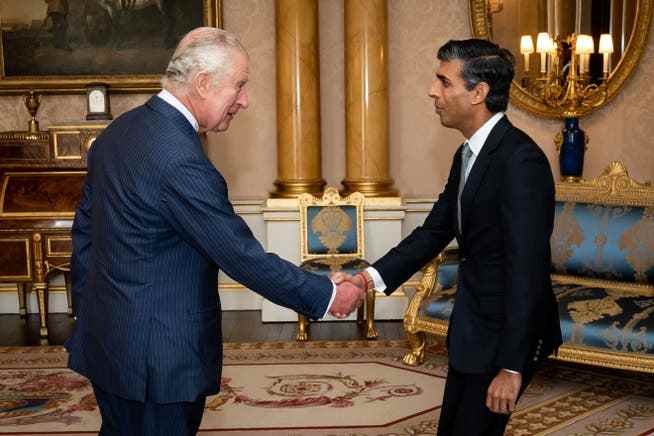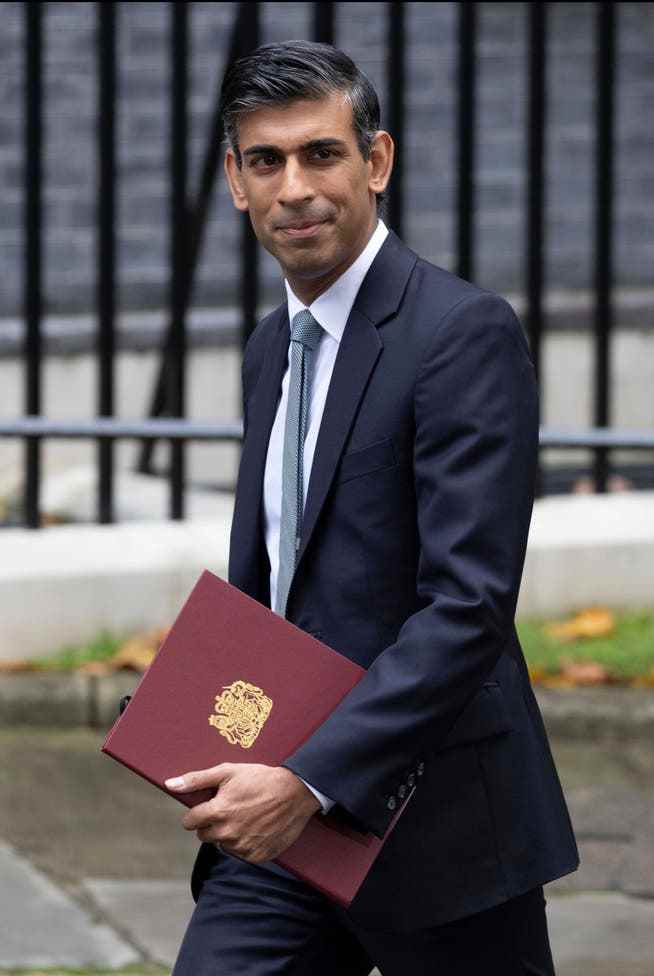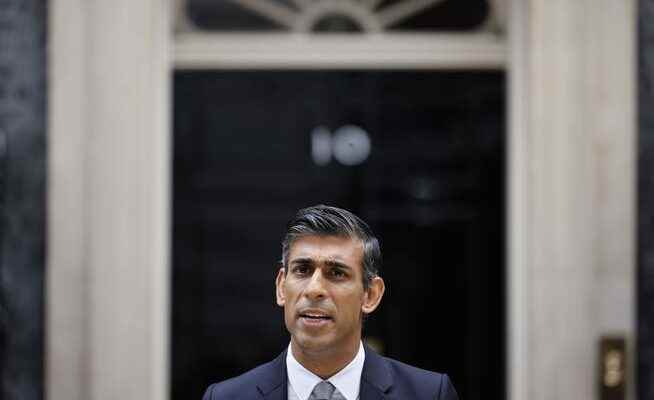The new British Prime Minister is signaling a departure from his predecessor’s economic and financial policies. But he leaves a number of Truss allies in key positions to broaden his support within the faction.
Rishi Sunak struck a sober note in his first speech as Prime Minister outside his Downing Street office.
Actually, changes at the top of the British government are exceptional situations accompanied by ceremonies. Lately, however, residents of the Prime Minister’s venerable official residence at 10 Downing Street seemed to be handing over the doorknob. After Queen Elizabeth II installed Liz Truss as Boris Johnson’s successor a few days before her death in early September, King Charles III received on Tuesday Rishi Sunak for an audience to formally nominate him as prime minister and put him in charge of forming a government.
Contrast to Johnson and Truss
At the audience with Charles III. and his arrival at Downing Street, Sunak appeared serious, refraining from gestures of joy or even triumph. In his first address at his new headquarters, he struck a deliberately sober and realistic note – a sharp contrast to Boris Johnson’s unwavering optimism and Liz Truss’s overconfidence.

Rishi Sunak accepts the government commission from King Charles III at Buckingham Palace. opposite.
Sunak acknowledged his two predecessors with friendly words, but also marked distance. The statement that he would rule with integrity and humility and be accountable was a reference to Johnson’s affairs and scandals. His statements about Truss were even clearer: “Mistakes were made and I was chosen to correct some of those mistakes.”
Sunak didn’t try to sugarcoat the situation. “Our country is facing a profound economic crisis,” he said. “This means that we face difficult decisions.” At the same time, he rejected the criticism of the Labor Party, which is calling for new elections after the second change in government within a few months. He is committed to the electoral mandate obtained by Boris Johnson in the elections at the end of 2019 and wants to implement the promises made at the time.
However, the situation has changed dramatically in the last three years. Not only has the Tory party under Johnson and especially under Truss fallen to an all-time low in the polls. On the contrary, inflation, higher interest rates for British government bonds and the uncertainty on the markets created by Truss are likely to force Sunak to implement unpopular austerity measures and tax increases.
Jeremy Hunt remains at his post
Sunak stressed that he wanted to put economic stability and confidence at the center of his agenda. His decision to leave Jeremy Hunt in the office of Chancellor of the Exchequer should be seen as a corresponding signal. Hunt was promoted to Treasury Secretary by Truss just over a week ago to calm markets. Hunt has already reversed most of the tax cuts announced by Truss and is set to show next week how Britain can put its budget back on track in the medium term.
In addition, Sunak is bringing back allies, such as Housing Minister Michael Gove, back into government. Dominic Raab, who served as deputy prime minister under Johnson, is making a comeback as such and as justice secretary. Sunak fired about a third of Truss’s government team, but also retained a notable number of key cabinet members from his predecessor.

Rishi Sunak in Downing Street: The new Prime Minister also prominently integrates party rights into his cabinet.
James Cleverly, who is well connected in the party, remains Secretary of State. Ben Wallace, who organized British military aid to Ukraine under Johnson, remains Secretary of Defense. In doing so, Sunak is also signaling to Moscow and Kyiv that Great Britain is sticking to its previous course in the Ukraine conflict.
The close Truss confidant Thérèse Coffey will be the new environment minister. Suella Braverman, a migration policy hardliner and representative of the right-wing nationalist wing of the party, is returning to the Interior Ministry after a brief absence. She had previously held that post under Truss before resigning last Wednesday over a trifle, hastening the demise of Truss.
Although Sunak belongs to the centrist wing of the party, exponents of the party right and Brexit hardliners are well represented in his cabinet. Sunak is thus signaling an economic policy departure from Truss, but continuity in most other policy areas. Unlike his predecessor, who had only filled her cabinet with loyalists, the new prime minister is trying to broaden his power base in the faction. Because Truss failed not only because of the reaction of the markets to her financial policy, but also because of her inability to convince a majority of the Tory faction of her radical course.
